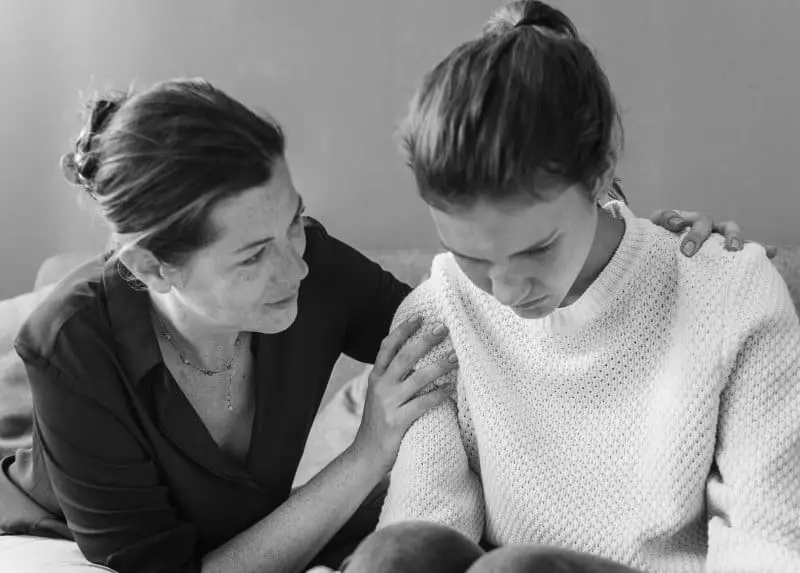Can A Narcissistic Mother Feel Remorse?
*We may earn a commission for purchases made using our links. Please see our disclosure to learn more.
One of the most difficult things for children of narcissists is to think that their parents don’t understand how badly they hurt them. This is particularly true for children of narcissistic mothers. Your mother is supposed to be a nurturing presence in your life. She is supposed to make you feel good about yourself and help you become an independent, successful person.
The narcissistic mother, however, does pretty much the opposite. She tears you down and undermines your desire to become independent. She doesn’t see you as anything more than an extension of herself, and as such, she strives to keep you under her control. It’s natural to wonder if she will ever feel any remorse for her actions.
While it’s not possible to completely know what someone is thinking or feeling inside, it is true that narcissistic parents are loath to show any kind of remorse for their actions unless it benefits them in some way to do so. Basically, if they want something from you, they might feign remorse.
It’s important to understand the reason behind why narcissists can’t feel empathy and can’t see the damage they’ve done to their loved ones. With understanding comes compassion and insight into what you can do to heal.
Why Does a Narcissist Lack Empathy?
Narcissists basically see everyone in their life as an extension of themselves. This is due to the fact that they interact with the world through a carefully constructed false self-image. They have infused that facade with grandiose ideas and are constantly telling themselves that they are entitled to the best things in life.
They come to believe that it is the responsibility of those around them to cater to their every desire, including their own children. This is part of why your narcissistic mother can’t understand the damage she’s done to you. She believes it is your duty to do what she wants you to do.
This is also why narcissistic parents don’t want their children to become independent and have little or no need for their parents. Your toxic mother wants you to ask her everything before you make a move. She needs that to feel important. That’s part of how she gets her narcissistic supply needs met.
Narcissists also convince themselves they are all-powerful and all-knowing, and for that reason, you can’t possibly make a better decision than they can. That’s also why they believe you should always ask their opinion before making a decision in your own life.
When Will a Narcissist Show Remorse?
When a narcissist shows remorse, it’s usually a ploy to get you to do something they want or get them something they need. Basically, the benefit of showing any kind of regret has to outweigh the cost. The cost for them is that it exposes them to criticism and feelings of vulnerability. That’s something they don’t take lightly.
When they do show remorse, they will often try not to show it to you directly. For example, if your narcissistic mother needs something from you, she may be willing to admit she has made mistakes with your siblings, but she won’t acknowledge her mistakes with you.
For a narcissist to express remorse, you can be sure it is a calculated move and they will likely only admit to what would be considered small mistakes. Don’t expect your narcissistic mother to ever admit that she made huge errors in the way she raised you. She might admit to a small mistake to get you to do something for her, but it won’t be anything very substantive, and it’s unlikely she really believes she made the error.
Do Narcissists Ever Express Genuine Emotion?
While everyone feels emotions, narcissists don’t really show them very often. It can also be hard to tell what they’re really feeling on the inside. Narcissists like Magnus Van Agteren say, “Absolutely. I feel guilt, remorse, and shame– all three.” While that may be true, they don’t show those emotions or act to remedy the problems they’ve caused very often.
They have become so adept at burying their true feelings and feigning the emotions they believe are appropriate that they themselves might not even know how they truly feel about something. While I’d like to be able to say that your narcissistic mother really loves you deep down, the truth is that she likely rarely thinks about you in that way because it would open her up to being vulnerable. If you let yourself feel real love, you risk feeling real loss.
It’s also true that her love is conditional. If you behave like she thinks you should, then she feels affectionate toward you, but if you don’t do what she wants, that affection turns to disappointment and resentment in a heartbeat. She’ll bury those feelings of love as quickly as she’ll let you know all about her disappointment.
Moreover, she’ll use the fact that you’ve disappointed her to make you feel guilty for being a bad child. She will criticize your actions or words without ever acknowledging the impact her own words and actions have on you and your life.
Does a Narcissist Ever Feel Guilty?
Guilt is another emotion that few narcissists really express. It means admitting, even to themselves, that they made a mistake. To do that would be to make themselves vulnerable to criticism, and it would expose them to their own self-loathing.
To admit guilt means that you might not have all the answers. This is anathema to what most narcissists are trying to project to the world. The internal conflict that this type of exposure creates for the narcissist can be devastating. It can even result in a level of decompensation that can make them dangerous to themselves or other people.
Do Narcissists Ever Show Genuine Emotions?

Narcissists don’t show their true emotions very often, but that doesn’t mean they don’t feel them. Everyone feels emotions, but the degree to which they express them varies. Interestingly, many people who have trouble expressing their emotions for humans can express them for other entities, like their pets.
This may be a way for them to vent, and of course, they may also genuinely love their pet. It’s also true that the narcissist can’t have the same expectations of a pet that they would have for the humans in their life. Moreover, their pet doesn’t judge like the humans in their life often do.
For that reason, you might see genuine emotion from a narcissist when they talk about their pets or if they lose a pet. They might also be capable of expressing real emotions for situations where they are not directly affected.
For example, a narcissist might be able to show compassion or empathy if they read or hear a new story about a child being hurt. This is not something that can possibly directly affect their self-esteem and that’s why they might feel comfortable expressing their true feelings.
Final Thoughts
For the children of narcissists, there’s not a lot of comforting news here. Your narcissistic mother might feel something like remorse deep inside her, but she is just as likely to bury those feelings and express something completely different to you.
That’s not to say she doesn’t love, but perhaps a better way to put it is that she doesn’t know how to show you the love she may feel for you. She also doesn’t know how to deal with or express any remorse that she may feel for the things she has done to you. That’s a difficult truth, but accepting that may help you understand her better.
Now that you have a better understanding of your narcissistic mother and her ability to express emotion, you need to check out this post about how to emotionally detach from your narcissistic mother so you can protect your own emotions. If you’re dealing with a narcissistic mother, you need all the help you can get to protect yourself.
--
If you want more tips for dealing with narcissists, setting boundaries, and managing emotional triggers, make sure you subscribe to my youtube channel





